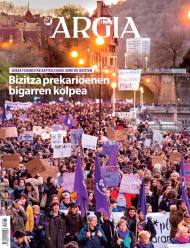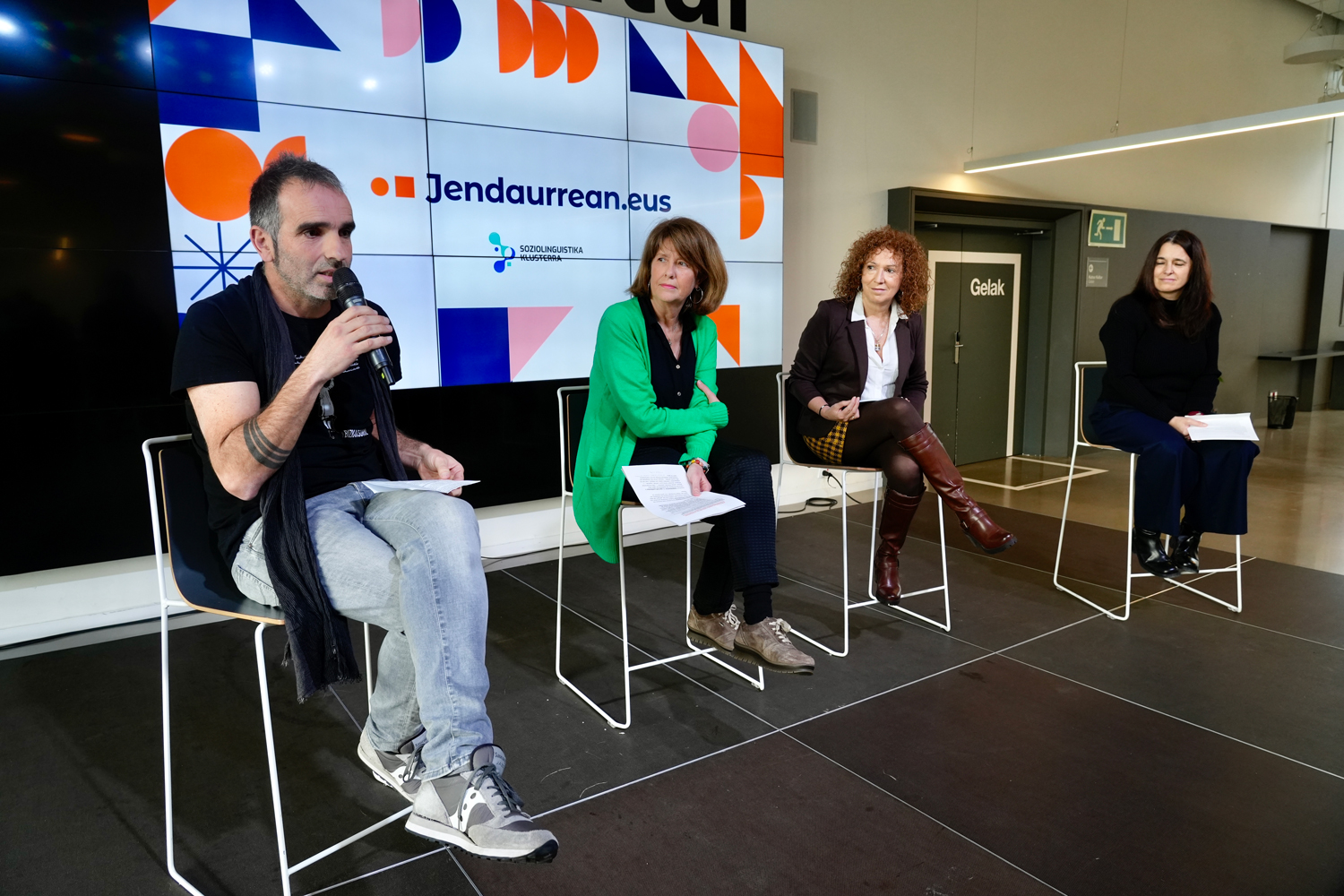"We are Euskaldunes, but we still do not know how to buy bread in Euskera"
- Eneko Gorri (Angelu, 1983) offered a talk on The Age of Use: a look from Ipar Euskal Herria at the Topagunea Conference, on the road to the renewal of the Euskaltzale movement that was organized on January 31. Gorri believes that in the youthful sector they are more connected to the Basque than ever before. The management work proposes to leave the old and create their model of militancy.

In the following lines you have the second part of Eneko Gorri’s speech, which spoke about use and militancy. The videos of all the talks are available at the following address:
Eneko Gorri: We have had a social exercise, Euskaraldia, to make knowledge into use. Several initiatives have previously been developed in the Northern Basque Country and in the urban area of Baiona-Angelu - Biarritz (BAM). Euskaraldia can be criticized as much as we want, but it has had a fundamental contribution in our environment, and that is that it has explained to us the problems, difficulties or limitations we have to live in Euskera.
For half a century we have developed tools, we have created transmission channels, we have been literate, in Castilian and Spanish families like mine have been Euskaldunizado sons and daughters, we have created some miracles, and this is from Christ, but we still have knots, we are Euskaldunes but we still do not know how to buy bread in Basque. Technically we know how to ask, but we are filled with knots before an erdaldun to give our first words in Basque. In front of a stranger, even inside the house. In our partner, Euskera is not the starting language, we have great difficulty in moving to another language. Euskaraldia has channeled awareness, both on the urbanized coast, on the French coast, and on the interior, more Euskaldun and rural. When we talked to friends in the interior, they told us that Euskaraldia was not for them, that it was from the cities, that they knew who they were talking to in Euskera in the small town and who they were not with. All right, why would we not be talking to a Frenchman in Basque? And when we leave Baigorri, when we leave our small town, what kind of linguistic behavior do we have?
We heard the people of the cities say, “In cities Euskera cannot practice, there is no choice, it would be free to speak the first words in Euskera or maintain the Basque language, or give bilingual interviews on the floor. That is true for the South or for the Basque people, but it is not good for us.” In the end, after this bad faith, the awareness of the individual and collective difficulties we have to live in Basque is retained. It's a very interesting fuel for the future.
Recovering the rebellious tone of vasquism
I know that what I am going to say now is uncertain and that it breaks a bit with the principle of social consensus that we want to build, but I believe that from the moment we bet on the use of the Basque Country, at least in Ipar Euskal Herria, we began to build a new rule, and the construction of a new rule is important even before we achieve the universalization of knowledge of the Basque country. We bet on the use of Euskera, and the first and subsequent words are given in Euskera, and we decide that as Euskaldunes we are no more second-level speakers. At the bottom there's a little point of disobedience that attracts me a lot.
To be Euskaltzale at the age of 15-25 was to be Abertzale decaffeinated. We had other much more noble struggles: internationalism, revolution, national construction, feminism... I find it very interesting to recover the aggressiveness with regard to the Basque country, especially since the young generations do not have our link with the Basque country. I remember when I was 5 years old, the demonstrations in favour of ikastola ended with bullets and tear gas. Today, young people do not have the same relationship, the same conviction with the Basque Country, but if we give that tone to the Euskaltzale, I think we are feeding another logic. Perhaps in Jon [refers to the conference of Jon Sarasua that morning] it seems to me that in the youthful sector of Ipar Euskal Herria they are more connected with the Basque than ever before, and that is a source of hope. At the Euskal Herria Zuzenean music festival, at the age of 18, our norm was French, in popular movements it was the French norm. We were revolutionaries, we spoke French, just.
New generation as a guide
If we remember the age pyramid, it will be the young generation that has the burden of Euskera on its shoulders and it will be she who leads that process. It's not going to be easy for them, but for their grandparents the creation of the ikastola wasn't easy. Therefore, they will do so as our parents have done. I wouldn't want to get into an intergenerational fight. Today's young people won't do better or worse than they did before. They will do their thing. If we can humbly send you a message: don't just manage the tools that the previous ones have created, invent your tools. At 18, you don't have to be managers, you have to leave those tasks to older people like us.
The battle for the recovery of the Basque Country will be difficult if we do not win the battle of entrepreneurship or militancy again. I will try to develop this idea. We're always saying that militancy in Ipar Euskal Herria is also in crisis, that today's young people are individualistic, that today's societies are more liquid... I agree, but we always look at Euskera from the eyewear of pessimism in some sectors. Militancy hasn't disappeared so much, militancy is changing, and what we've known or what our ancestors have known is different. We take some examples and we always look at them and that's the most symptomatic.
In Uztaritze, the Labortano Congress has been held for 50 years, and last year it has disappeared because of a crisis. But the same year that it has disappeared, the Uztaritze dances group has celebrated 30 years and to do so they have mobilized 130 people to set up a horse riding in Euskera for eight months. It has been issued twice and 2,500 people have approached it, who have not been able to attend. They've created a great project. If they had given the assembly a percentage of the energy needed for this horseback riding to be formed, the assembly could resume. But everyone has realised that the assembly has disappeared.
The popular movement and militancy are not disappearing, they are moving, and I think they are moving too much towards management.
I'm going to take the second example. At 5 years there were five ikastolas in Ipar Euskal Herria, 36 ikastolas at 36 years old. You have to manage 36 ikastolas: party commission, life commission in Basque, works commission, decoration commission, office, board of directors… Is that not militancy? There are hundreds of fathers and mothers working every day at 36 ikastolas. Therefore, militancy is shifting to management.
Turning to the young generation, in our generation we did not raise a disobedient attitude in an official examination of the French State. Last year, almost a very short (certified) classroom has decided to spend in Basque for disobedience. They are 16 years old. We are reproaching to them the crisis of militancy. Those of yesteryear have done what they had never done; it was done with the bass, but they were eight students. Let's take those glasses off, the Euskaltzale is transforming, nostalgia is useless.
Plazara, AEK, Uda Leku, Dindaia eta Ebete antolakundeak Baionan elkartu dira Famili'on egonaldi ibiltariaren lehen edizioa aurkezteko. Hizkuntza mailaren arabera eskaintza bat edo beste egongo da eta haur zein gurasoentzat izango da udaberrian.
I think it will have to do with the hangover of the profession, but I have to acknowledge that I look at the linguistic landscape of the places I visit. Signs that stick on the walls, hanging from streetlights, billboards, and supports that appear in shops or companies (signs,... [+]
























